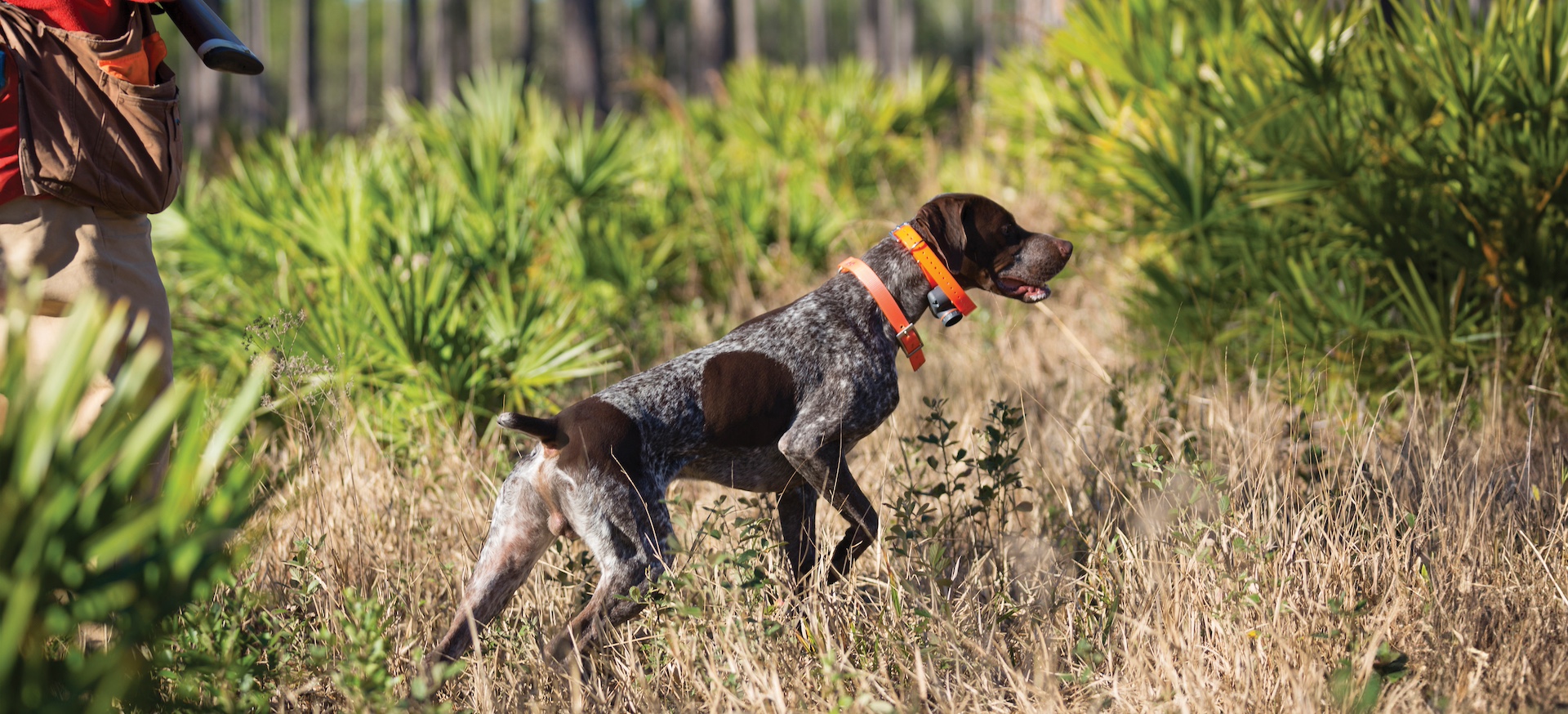The Sporting Life
From Daniel Boone to Teddy Roosevelt, outdoor pursuits are central to the American story.
While European immigrants came to and founded the United States for many reasons, among them was access to natural resources. In Europe, land ownership was tightly controlled, and those without property faced severe restrictions on hunting and fishing by laws that could impose death for those who hunted on the lands of the wealthy.
For settlers who crossed the Atlantic, the New World offered what appeared to be unrestricted access to land and its wildlife resources. Subsequently, a truly American approach to both evolved.
HUNTING AS A SPORT
It is believed that the sport of hunting originated in 1534 when a Norfolk farmer started using dogs to catch the foxes that plagued his farm. At that time, foxes were seen as vermin, and farmers hunted them to control their population. But it wasn’t until the 18th century that fox hunting turned into a proper sport.
Hunters started targeting foxes and hares with packs of scent hounds that were specifically trained for sport. The Bilsdale Hunt in Yorkshire, established by the Duke of Buckingham in 1668, is the longest running and world’s oldest fox hunt.
During this same time, large numbers of European settlers arrived to the American landscape, which provided new opportunities for the hunting they enjoyed in England.
The early roots of American sporting clubs started in the late 1800s. At that time, unrestricted hunting and land-use practices were causing a decline in North America’s big game populations. Theodore Roosevelt, who witnessed this firsthand on his many trips to the Dakotas and Yellowstone area between 1883 and 1886, took action to protect America’s wild lands and established the Boone and Crockett Club in 1887.
Over the following decades, the club played a key role in initiating science-based wildlife legislation and creating federal land management agencies such as the U.S. Forest Service and National Park Service. The organization ultimately passed “Fair Chase” hunting ethics in the late-1800s, which continues to influence both hunting and fishing game laws throughout North America today.
THE RISE OF SOCIAL ANGLING
A look back into the earliest known recorded history of fishing, from the Far East to ancient Egypt, humans have ventured out onto water and fished to provide food. They started by using primitive techniques such as tying vines and roots into nets, crafting spears from sharpened branches, and even making hooks from shells.
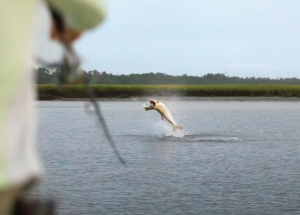
The sporting life at Sea Island offers guided seasonal, quail hunting (top) and year-round sportfishing (above).
Fishing started as a means of survival and eventually turned into a popular sport, with the birth of game fishing becoming popularized alongside the publication of Isaak Walton’s The Compleat Angler. When English settlers brought their traditions to the Americas, they continued fly fishing for small game. But it was in the 1800s when sport fishing really took off, as pioneers worked on developing the tackle and techniques needed to catch big game fish in offshore waters.
A private club for fishermen, The Schuylkill Fishing Company of Pennsylvania became the first “social angling club” in the Americas and helped to establish new state legislation that guaranteed citizens the right to fish, “in all boatable waters,” providing a liberty that was previously restricted in England.
As tackle and techniques evolved, sport fishermen from local clubs started embarking on long-range expeditions and competed against one another in search of big game. Some of the earliest recorded fishing competitions took place in the late 1800s, when anglers earned buttons for capturing fish of record sizes. The International Game Fish Association was founded in the early 1900s and provided modest trophies for official world record holders. Today, competitive prize money can be in the millions for a single tournament—with an estimated 40,000-plus tournaments annually.
SOUTHERN SPORTING CLUB
Carved from the grounds of one of the nation’s oldest hunt clubs, Broadfield Sporting Club & Lodge is a private hunting and fishing compound situated on 5,800 acres, offering a variety of activities including sporting clays, rifle and pistol ranges, quail hunting, pheasant shooting, and freshwater fishing on two lakes stocked with bass and bream. Additionally, Broadfield members can hunt deer, turkey, boar, and dove at certain points throughout the year.
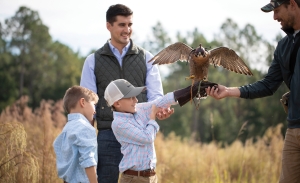
For non-members, access to the club is an amenity that is exclusively reserved for Sea Island guests. From April to October, those who have booked the resort’s “Broadfield Experience” are transported from their Forbes Five-Star accommodations and granted entry to the club’s private grounds. “Whether they come out for the day, or half day, Sea Island guests are introduced to the facility with a Lodge and Garden tour before being whisked off on a bird buggy for dog training, falconry demonstrations, and 5-stand shooting lesson,” states Lee Barber, Broadfield Manager.
What separates this retreat from most other sporting clubs, however, is its falconry program. Equipped with a leather glove, Sea Island guests quite literally join in the hunt with their arms wide open. “It’s like theater-in-the-round,” says Barber, “to watch our peregrine falcons (the world’s fastest animal) come crashing down on their prey at speeds as high as 250 miles per hour.”
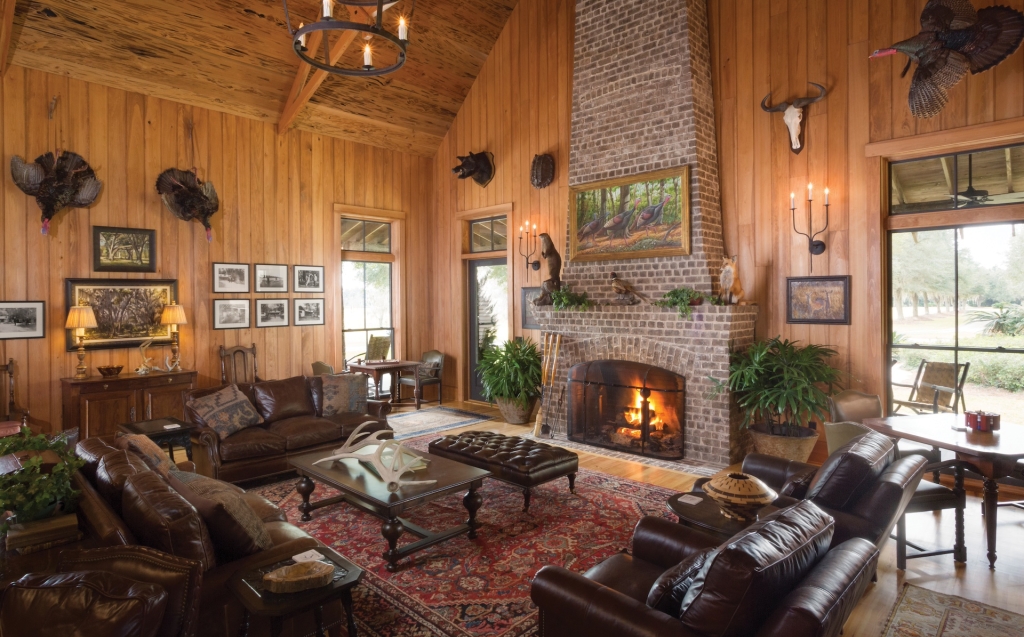
A look into The Lodge at Broadfield.
At Broadfield—whether you’re aim is hunting, shooting, or just observing—the offerings are simply unmatched. But outdoor pursuits, for Sea Island guests, don’t stop there. Just 45 minutes north of Broadfield, a wealth of world-class sport fishing experiences await at the resort’s Coastal Experience Center.
A fleet of boats and their corresponding captains offer something for everyone. Including inshore, nearshore, and offshore fishing, the resort touts hundreds of excursions every year and even offers family-focused trips for its younger anglers. However, visiting from June to October is your best bet in order to take full advantage of the tarpon season, a fish that is in abundance in the region. Known for their power, acrobatic jumps, and stamina—which make for a fun fight on rod and reel—tarpon is considered one of the world’s top game fishes.
Aboard a custom-built 27-foot center console fishing boat, one of the resort’s many captains will take guests all along the Georgia coast to chase these legendary fish each season. “It is a highly sought-after and addictive sport among saltwater fishermen,” states Jon Kent, Director of Outdoor Pursuits at Sea Island. “It’s true when they say that tarpon fight like no other fish in the ocean.”
From land to sea and everything in between, the range of wildlife activities at Sea Island would easily fill all the hours in Daniel Boone’s day. With a shooting school, salt marsh kayaking, horseback riding, hunting excursions, and more—Sea Island has easily earned its title as the only Forbes Five-Star resort with a true southern sporting club experience.
FROM FIELD TO TABLE
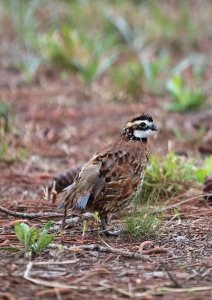 Turning wild game into gourmet meals is a skill that Broadfield Chef de Cuisine Paula Garrett has mastered over a lifetime. For those skilled enough to claim a bounty during their Continental-style pheasant shoot (offered twice a month during fall and winter) or quail hunt may have their prize prepared for them. “For chefs, beginning or seasoned, cooking game birds offers a particular challenge. Not only because they have various distinctive flavors, but you also want to pay respect to the animal,” says Garrett. “But, there is no better food in the world. It’s as natural as it comes.”
Turning wild game into gourmet meals is a skill that Broadfield Chef de Cuisine Paula Garrett has mastered over a lifetime. For those skilled enough to claim a bounty during their Continental-style pheasant shoot (offered twice a month during fall and winter) or quail hunt may have their prize prepared for them. “For chefs, beginning or seasoned, cooking game birds offers a particular challenge. Not only because they have various distinctive flavors, but you also want to pay respect to the animal,” says Garrett. “But, there is no better food in the world. It’s as natural as it comes.”
For preparing game birds, Garrett offers these tips. “Acids, such as lemon juice, work wonders with tougher birds because it helps to tenderize the meat. Light-meat game birds, such as pheasant, quail, or turkey can benefit from brining, which not only adds flavor but also moisture. Lastly, the use of herbs should not be overlooked as you consider accompanying flavors you can take from the bird’s habitat—think juniper, blackberries, or elderflower.”




